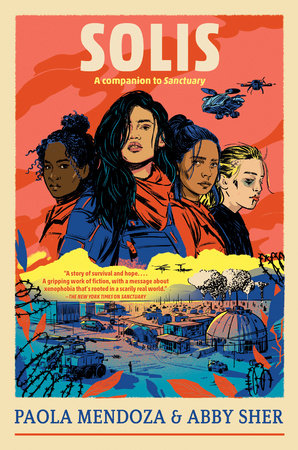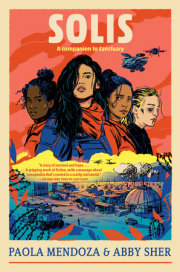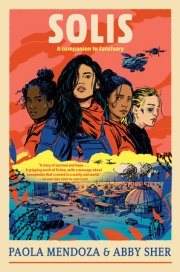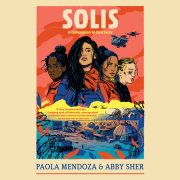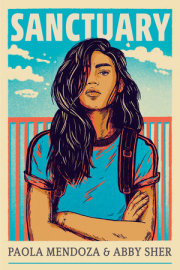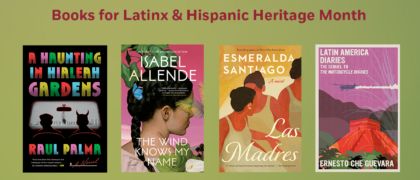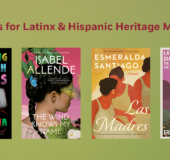VALI"Drop!”
I’ve heard that word so many times now my body responds without even thinking about it. Within a second, I’m in the straight-arm rest position, though there is nothing restful about it.
“Push ’em out, soldiers.”
“One!” Twenty-four men and women shout in unison as we do a push-up.
“Two!” Quick, determined, and strong voices bellow out into the desert air.
We are all here for one reason and one reason only: SOLIS’s Special Ops team known as Condor.
I don’t count when I’m doing push-ups, sit-ups, burpees, or any other exercise they make us do. I stopped counting after the first day of boot camp. I didn’t feel determined or strong when I counted, both of which I needed to be in order to graduate from this inferno. Instead, I mouth the numbers, but in my mind, I repeat my prayer, my mantra, my reasons for being here:
Mami, Kenna, Rosa, Tomás, Volcanoman, Kenna’s parents, Uncle Jimi, Ms. Kochiyama, Mr. Rashid, Mal’s abuela, the women at the safe house . . . I never knew their names, but I’ll always remember their pleading eyes.
Over and over I say their names. These people whom the Other 49 have taken from me. They are the people I am fighting for. They are the people I am going back for.
No one believed I would make it to this day. My commanders laughed in my face on the first day of boot camp.
“I give her until lunch!” they roared.
“Nah, she’s small but tough. Four days and she taps out!” the nice one said.
They were right. I am small. And I had to become tough. Everyone around me was stronger, bigger, and older, but I had something they didn’t have.
A year ago, I was living with Mami and my brother, Ernie, in Vermont when the world split open. A teenager was killed by Border Patrol on the border between the United States and Mexico. Chaos broke out. Land mines exploded, killing who knows how many people. Out of the cracks of this dysfunction and hate came the Deportation Force. They started hunting anyone who was undocumented. California decided it wouldn’t go along with their plans. The state stopped being part of the United States of America and became its own country, the Commonwealth of California. They told anyone who wanted sanctuary from the Deportation Force to come to their country. Mami decided we had to go. It was the only place we would be safe. But Mami didn’t make it. They took her on the outskirts of Boston, and I was left to get Ernie, my eight-year-old brother, to California.
Whenever I close my eyes, I am running again. Running from that bus station where Mami was taken. Running from the grocery store near Sister Lottie’s while the dogs were barking and snapping. Running to the river and throwing myself into the cold, dark unknown.
It took us thirty-six days to get from Vermont to California. But I didn’t find peace in California. I tried for a few months to belong. I went to school, but I wasn’t able to make friends. I was no longer interested in talking about my latest crush, or in makeup, or in choreographing dances. I joined community groups that focused on trying to save our water sources, but all I could think about were the moments the DF took my best friend, Kenna, or when they killed Tomás or, or, or. I stayed as long as I could for Ernie’s sake.
I wanted to be the big sister that Ernie needed, the source of love and support that he obviously craved. But I couldn’t be that. I couldn’t play soccer, or help with homework, or clean up our rooms. I couldn’t pretend that our life was normal.
There is nothing about this world that is normal anymore.
I tried to explain to my tía Luna and Ernie why I had to go back to the desert. I told them there were too many faces haunting me, too many unanswered questions, and too much anger.
I am filled with anger. Sometimes I feel like I am going to choke on it. My lungs are swimming in it. The only thing that calms me is my prayer . . .
Mami, Kenna, Rosa, Tomás, Volcanoman, Kenna’s parents, Uncle Jimi, Ms. Kochiyama, Mr. Rashid, Mal’s abuela, the women . . .
“I’m gonna bring Mami back. I swear,” I told Ernie.
But he just scowled at me. “Stop,” he said. “You can’t promise stuff like that.”
Ernie is so much older than his nine and a half years on Earth. This world has aged him too much, too fast. His chubby cheeks are gone, and his eyes dart around a lot, like he’s always on the lookout, always being hunted. Was there ever really a world where we played in a schoolyard and blew on dandelion fuzz?
About a week into our time at Tía’s, I realized that Ernie had these gaps in his mouth where he’d lost his baby teeth. He must’ve lost them while we were on the run, but he never told me because we were focused on trying to escape the DF.
Ernie and I have been through so much together. The meat truck filled with swinging carcasses where we saw a man get killed; the DF drone taking away a broken Rosa and a lifeless Tomás as we cowered in the trees. We jumped onto a moving train as it hurled toward California. We tied ourselves to the top of that train. It was the only way to not fall off. To not die. And yet I think it was my biggest mistake because it kept me from Mami.
The rope did its job too well. Holding us down when I wanted so badly to run. In the distance I saw the glints of cages, the icy-blue lights in the wrists of people who had been captured and taken by the DF. They were the disappeared, but by the miracle of luck, we found them in the desert.
The train brought us the unexpected gift of possibility. The gift of Mami. Through my binoculars, I saw her in the distance. I’m almost positive it was her. The blue light glowed in her wrist. She was chained to people in front of her and behind her. She was struggling to walk. But it was
her walk. Her head tilted slightly to the right as if constantly questioning the world around her. Her hips swaying side to side, always in rhythm to a vallenato, a salsa, or a cumbia. It was how she walked in our apartment before the DF came, the way she moved in the kitchen as she made ajiaco, the way she paced around the barn when calves were about to be born.
There she was, alive. She was a couple of miles away, and an unfinished wall surrounded her, but I was sure it was her! And I needed to get to her.
I tried to untie the rope. But I couldn’t. The train kept moving away from Mami as I picked and pulled at the knots binding us. I almost had it! I was so focused on the rope, I didn’t notice the DF as they approached our train, but Ernie did. His screams crashed me back to reality. I could hear the buzzing drones flying toward us. The train slowed. The drones appeared, ready to swoop us into their claws. I stopped thinking about Mami and focused on the rope. I had to untie us. Our freedom depended on it. My fingers worked miracles. We jumped off the train like birds taking flight for the first time. We smashed onto the ground, slid down a ravine, and ran away into the desert.
At that moment, I was forced to choose between Mami and Ernie. I had to decide between what was right in front of me and what might be in the distance.
I promised Mami I would get Ernie to California, and I did.
I promised myself I would go back and get Mami. And I will.
× “ON YOUR FEET!” shouts our commander. “Go, NOW! NOW! NOW!”
This is it. This is what I’ve been training for these past six months. The notorious and infamous S obstacle course. It was inspired by the Navy SEALs’ training course back when California was part of the United States. But SOLIS made our course a million times harder. So here I am, running toward an obstacle course that is so impossibly difficult, more than half of us won’t finish it. And to top it off, only the first six who cross the finish line will become Condors.
The course is made up of eighteen separate sections. Excruciating rope climbs, a one-hundred-foot cargo net wall, barbed wire tunnels, electrical walls we have to climb over, which are exact replicas of the new border walls that separate California from the Other 49. The worst obstacle is the weaver. Its metal bars are about twenty feet off the ground, and we must weave our bodies in and out without falling, all the while making sure we don’t touch the poison thorns strategically placed on the bars. Good news is the thorns won’t kill you. Bad news is, if you touch them, the sting is so unbearable there’s no way you’ll finish.
The S course is complete hell on your body. It’s designed to make your heart rate spike in seconds, burn out all your muscles, tap into every irrational fear you have. A small mistake might break your bones, paralyze, or kill you. It’s the ultimate test. If your mind and body can handle this, then you can go into enemy territory and not only survive but finish your mission.
Every part of this course terrifies me, and yet I know it’s the only way.
THE WALL I pull myself up the cargo wall. Before I know it, I’m halfway there, fifty feet above the ground. My size is an asset as I climb. I’m light and fast; the rope doesn’t buckle under my weight. I’m like Spider-Man making my way up a building, while the big guys are like clumsy bears. They ram their feet into the holes and get stuck in the netting. Their bodies splay out like eagle wings. They cuss and scream at themselves as I pass them. I can’t hide my smile. It feels good to prove them wrong. I knew nothing would stop me from going back to the Other 49, to the desert, to my mami.
THE WATER A Condor must be an expert in the water. We must be able to accomplish our missions no matter where they take us—oceans, rivers, deserts, or battlefields. I jump into the ice-cold water. My hands are bound behind my back, and my legs are taped together at my ankles. I slowly sink to the bottom of the pool. I have to fight against the instinct to kick, to squirm, to scream. My heart starts to race. My chest constricts. It doesn’t matter how many times I’ve done this, my body always panics. It thinks it’s drowning in the Colorado River. I get pulled back into memory. I see the bullets passing me in the water. My lungs burn for air. I’m counting strokes. I’m hurrying Ernie away from the DF. I have to quiet my mind. I’m not back there. I’m here in the S course. Trying to become a Condor.
My feet touch the bottom of the pool. I bend my knees and push off the ground toward the sky as hard as I can. I break through the water and inhale gulps of air. It feels so good to breathe. The sweetness doesn’t last long, though. I sink underwater again, searching for the bottom of the pool with my feet. My mind focuses on what I must do—forty sinks, forty jumps. I don’t count. I list my names instead.
Mami, Kenna, Rosa, Tomás, Volcanoman, Kenna’s parents, Uncle Jimi, Ms. Kochiyama, Mr. Rashid, Mal’s abuela, the women . . .
I try to think about the lives that each of these people lived. The love they had inside of them. I think about their dreams. How Tomás told me he wanted to see the ocean. I think about the ocean now, and what it means to the Commonwealth of California.
California is desalinating the Pacific Ocean so we have enough water to drink, water the crops, and live. But we can only take so much water from the oceans before it becomes catastrophic. In California we recycle every drop of water. Toilet water becomes irrigation water. Shower water becomes cooking water. Leaky faucets do not exist in the Commonwealth of California. Every speck of grass in Southern California is gone, replaced with plants that are meant to live in the desert. We all understand these are small gestures and our water crisis won’t be fixed this way. The only way we will survive as a country and as a planet is if we figure out how to stop climate change.
Of course, all the scientists and governments of the world can’t seem to figure out how to reverse the damage done. So instead, they’re determined to control the weather patterns. This is the world we live in today. A world where every single country is in a race to control the weather so they can ensure their citizens have enough water.
The news gives us water updates every day. It tells us about the race and makes it clear that the Other 49 seems to be winning, which would be dire, especially for California. If the Other 49 wins the race, it’s almost guaranteed they will find a way to force us back into the union or maybe even obliterate us.
THE QUIET This is my last test. I have no idea where I stand in the competition. I don’t know if the first six have already finished and it’s all over, or if I still have a chance to become a Condor. I push the thought out of my mind. I can only concentrate on where I am right now.
I slither on my stomach through mud and leaves toward my target. I find a clear spot through the bushes to take my shot. There is a white circle the size of an apple painted onto the trunk of a tree. I only get one chance to hit the target. If I miss, I fail. If I hit it, I still have to get away without being spotted by my commanders. If they see me, I fail. I aim my rifle and squeeze the trigger slowly and deliberately. I hit the shot, just off the center. It’s not perfect, but it will do. I see my commanders zip around. They have no idea where I am. They’re searching, but they can’t see me. I press my body and face into the dirt. I’m completely camouflaged. I don’t move for forty-five minutes. I need to finish in the top six, but if I’m not patient I won’t finish at all. My commanders get distracted by someone else’s shot. This is my moment; I don’t make a sound. It’s like I was never there, just how I like it.
I return to where we began the race. In the center of the large clearing is a bell. I ring it to announce I’ve completed my mission. I’m so tired, I want to collapse. But I can’t. This final ritual has been ingrained in us. We must stay standing until we find out our placement, until we find out if we are good enough to fight as a Condor for the Commonwealth of California.
General Vargas of the Special Ops team approaches me. I can’t read her face. She’s like a block of stone with no emotion. Her hair is pulled back in a tight bun. Her dark black sunglasses hide her eyes. I breathe to ground myself.
“At ease, González.”
She stares into my eyes. Silence. I can’t stand this. I’m going to break open.
Mami, Kenna, Rosa, Tomás, Volcanoman . . .
“Valentina González, you are Special Ops number four. You’re secured.”
My knees buckle, but I catch myself before I fall. Tears stream down my cheeks. I wipe them away, my hands shaking uncontrollably. I want to hug her. I want to scream. I want to dance. But I can’t. I just stand there trying not to burst. General Vargas leans toward me.
“Your mother would be proud,” she whispers.
She places her hand on my shoulder. I look her in the eyes, unable to stop my tears. I am not surprised she knows about Mami. They know everything about us. Becoming a Condor means there are no secrets between me and my government. General Vargas turns on her heels and walks away.
Mami will
be proud, I correct her in my head.
Copyright © 2024 by Paola Mendoza. All rights reserved. No part of this excerpt may be reproduced or reprinted without permission in writing from the publisher.

